Special Initiatives
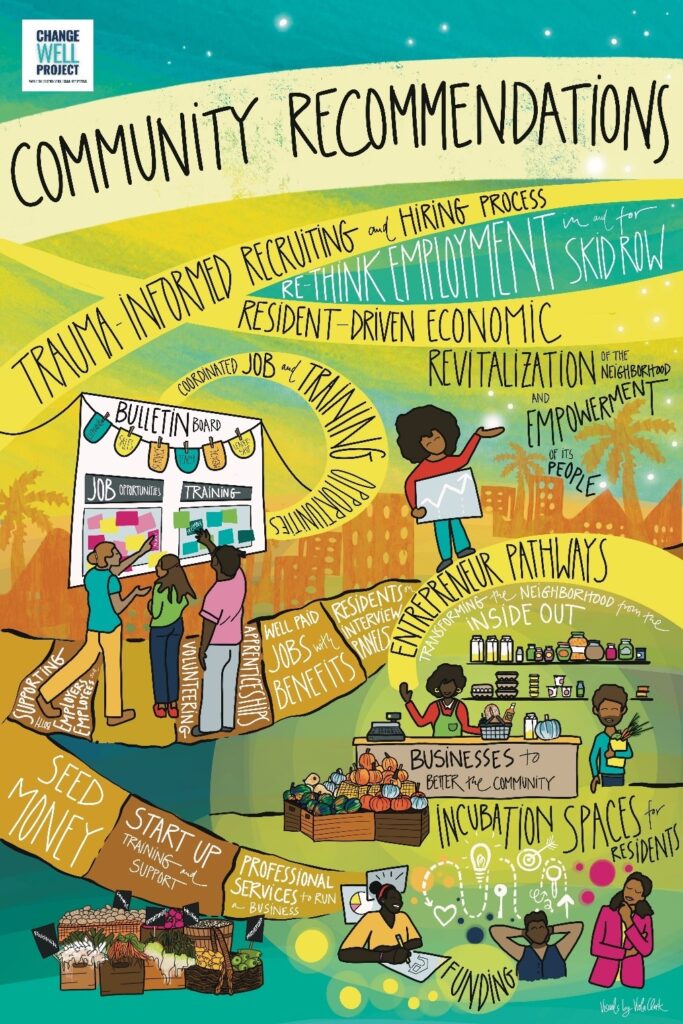
Skid Row Action Plan Report Update:
Please see here for a Health Services update to the Board of Supervisors and for an implementation report by our partner, Change Well Project. The update shares information about new projects, including additional beds and a triage site. The report describes the community design process, recommendations and results.
Overview:
The Skid Row Action Plan (SRAP) is a roadmap that aims to dramatically expand housing and other homeless services downtown while supporting the development of a culturally vibrant and thriving Skid Row community. Specifically, the Plan sets priorities to support safety and wellness in Skid Row by expanding access to interim and permanent housing, health care, harm reduction, and other supportive services.
History:
According to the 2022 Greater Los Angeles Homeless Count, about 4,400 people are experiencing homelessness in the Skid Row neighborhood. Of those individuals, 2,695 are unsheltered. As the epicenter of homelessness in the nation, Skid Row also experiences the highest overdose mortality rate in LA County. Acknowledging the importance of creating a healthy and safer community in a neighborhood that has been shaped by decades of structural and systemic inequalities, the Los Angeles County Board of Supervisors passed a motion introduced by Supervisor Hilda Solis in June 2022 to create the Skid Row Action Plan.
In June 2023, Housing for Health and partners were awarded a $60 million state grant to provide housing and services to an estimated 2,500 individuals experiencing unsheltered homelessness on Skid Row. The funding served as a catalyst for the Skid Row Action Plan, a $280 million initiative developed in collaboration with community members, business owners and service providers.
Community Collaboration:
Throughout 2023, community members, community-based organizations and government agencies collaborated during several design sessions to create recommendations for the Skid Row Action Plan. The workgroup members presented their final recommendations in December 2023 during a celebratory event at the Los Angeles Mission. Now the projects are moving toward implementation, as Health Services works on securing funding.
Skid Row Projects:
- Increasing the availability of safe interim housing and opening more pathways from interim to permanent housing
- Increasing the availability of and access to safe permanent housing
- Creating a Safe Services Space that centralizes access to a wide range of care services and programs that support and empower vulnerable populations
- Creating a health and behavioral healthcare center that offers critical services for those in crisis and those seeking a low-barrier entrance into preventative and ongoing medical care
- Creating a Harm Reduction Health Hub that increases the safety and wellbeing of those who use drugs through holistic support
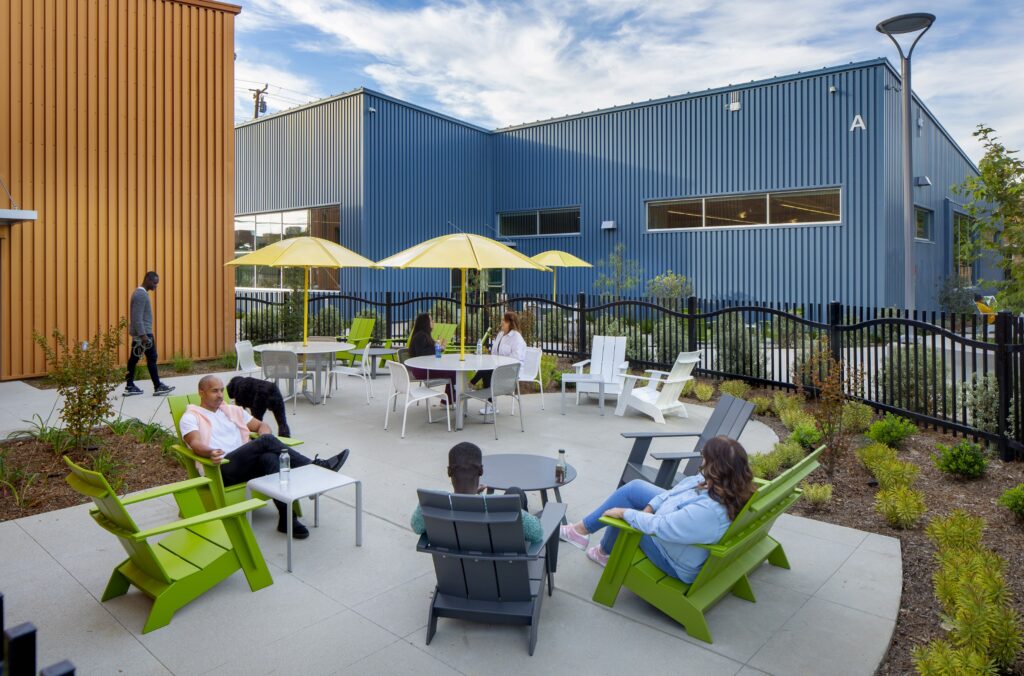
The Capital Improvement Intermediary Program (CIIP) manages the pre-development, design and construction of facilities that expand housing and services for people experiencing homelessness. Housing for Health works closely with its nonprofit partner, Brilliant Corners, and various sponsors to create exceptional interim and permanent supportive housing.
Our housing is designed with the social and emotional needs of residents in mind and includes spaces for community gatherings and specialized services such as health screenings and intensive case management. Project types include historical renovations, motel conversions, repurposing buildings for new use and ground-up construction.
- 1,318 units created to date; another 534 units are in the pipeline
- An additional 248 beds added through projects completed since early 2022
- Developed three Recuperative Care Centers on DHS LA County Medical Center Campuses, which added beds for 194 unhoused people with complex health care needs
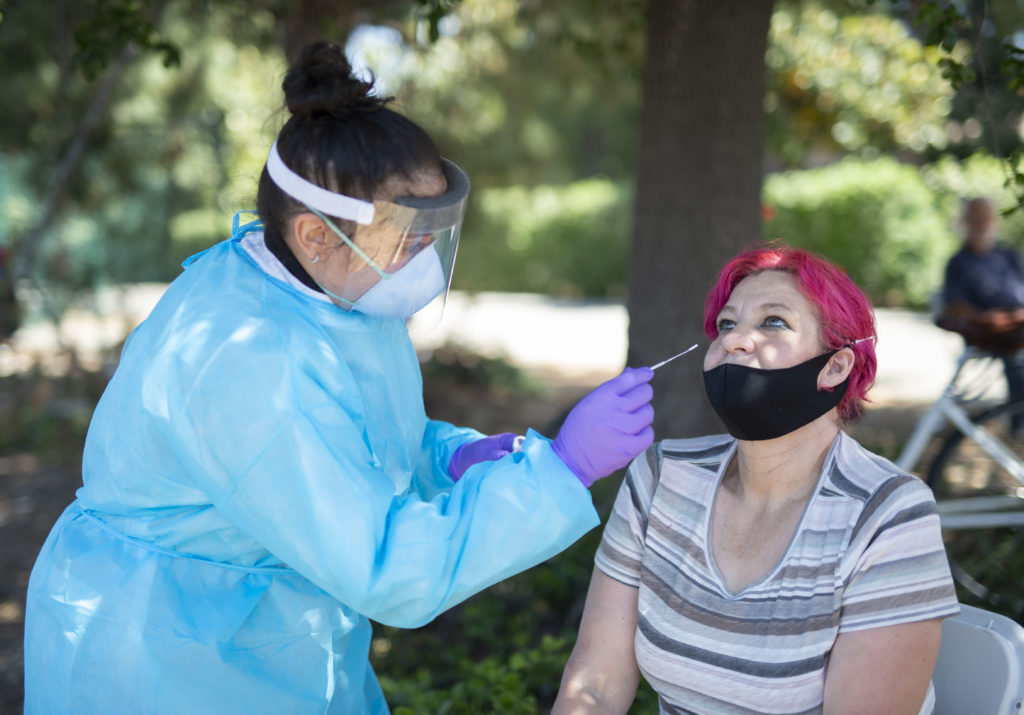
In partnership with the L.A. County Department of Public Health, Department of Mental Health, the Los Angeles Homeless Services Authority, and Chief Executive Office, Housing for Health developed the Countywide COVID-19 response for people experiencing homelessness, including:
- COVID Response Teams (CRTs) delivered infection control education, technical assistance, supplies, and testing to the sheltered and unsheltered homeless population.
- Medical shelters provided care to unhoused individuals who either tested positive for COVID or displayed symptoms and could not safely isolate or quarantine.
- Administered of COVID vaccines to the County’s homeless population.
Some programmatic highlights:
- 73% vaccination rate among unhoused people
- 44,497 total COVID vaccines administered
- 230 Peer Ambassadors recruited from the local community to bolster vaccine effort
- 278,983 COVID tests performed
- 10,000+ individuals received medical services across thirteen Quarantine and Isolation Facilities (QI)
- More than 2.5 million meals distributed
- Distributed 3,425 units of Naloxone

The Homelessness Prevention Unit (HPU) is a proactive, data-driven prevention program launched in January 2021 to identify County residents who are at high risk of becoming homeless and support them in stabilizing in their housing and improving their overall health. HPU staff work with clients for 4-6 months, providing them with flexible financial assistance, including rental assistance, utility assistance, vehicle repair and debt resolution, as well as linkages to County services such as health and mental health services, substance use treatment, employment/education support, benefits advocacy, and legal services.
Between January and July 2022:
- 100 HPU clients served
- 93% of clients retrained housing
- On average, $3,304 in rental assistance provided to clients
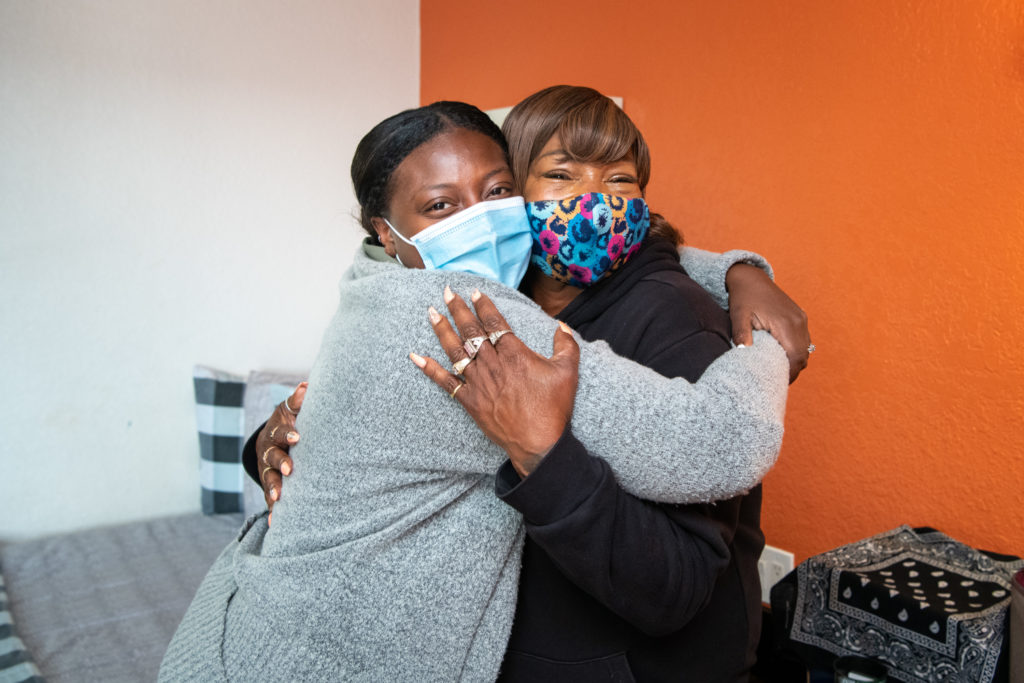
Program Description
Housing for Health’s Housing Stabilization Team began in July 2021 to outreach proactively to individuals utilizing County systems who may need short-term financial assistance to remain in stable housing. The Housing Stabilization Team is identifying participants who have recently received services in LA County and works with them to identify opportunities for enhanced linkages to community partners and supportive services. The Team is providing flexible financial assistance to assist participants in resolving financial barriers that put them at risk of losing their housing.
Because the Housing Stabilization Team is identifying and assisting clients using a data-driven approach, the Team is not actively accepting outside referrals. Eligible participants for the program will be identified and contacted by the Team and enrolled in the program after contact.
Housing Stabilization Team Members
- Associate Director
- Program Managers
- Community Health Workers
- Medical Case Workers
Services
- Financial Assistance
- Housing Retention Support
- Mental Health and Healthcare Linkages
- Substance Use Treatment Linkages
- Employment / Education Support
- Benefits Advocacy
- Legal Services Linkages
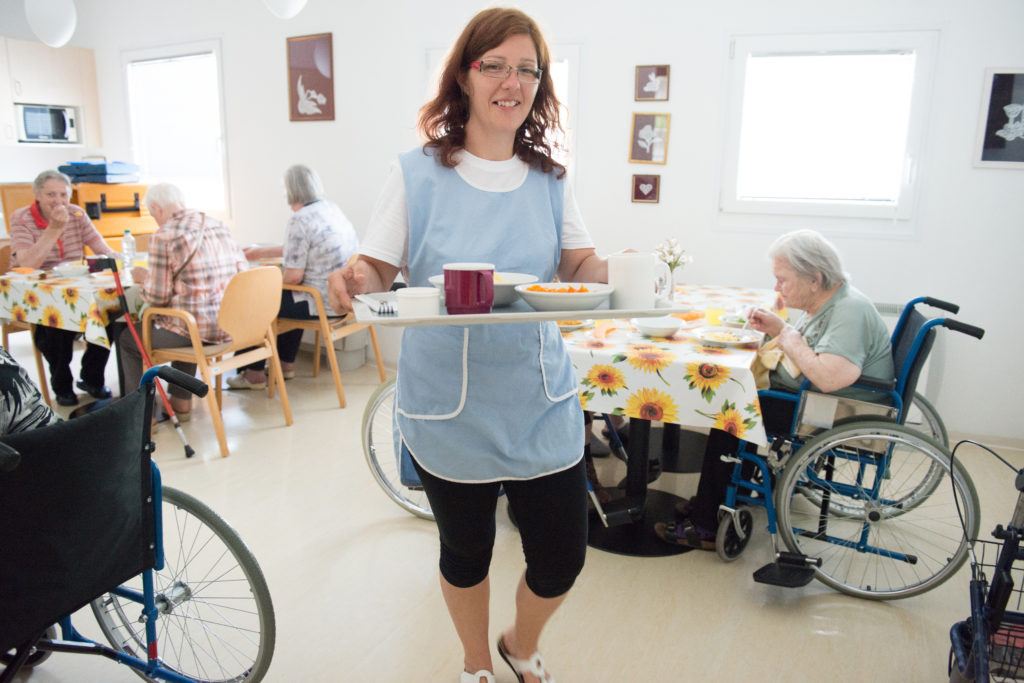
The Hospice program is a pilot project, funded by the Conrad N. Hilton Foundation and administered through Brilliant Corners to provide care for unhoused individuals who need care in a supportive environment at the end of life. Four recuperative care centers (RCCs) each have two designated hospice beds and partner with three hospice agencies to help individuals experiencing homelessness transition to death with comfort and dignity. End of life services are linked to people experiencing homelessness in Project Homekey, Permanent Supportive Housing (PSH), and hospital settings.
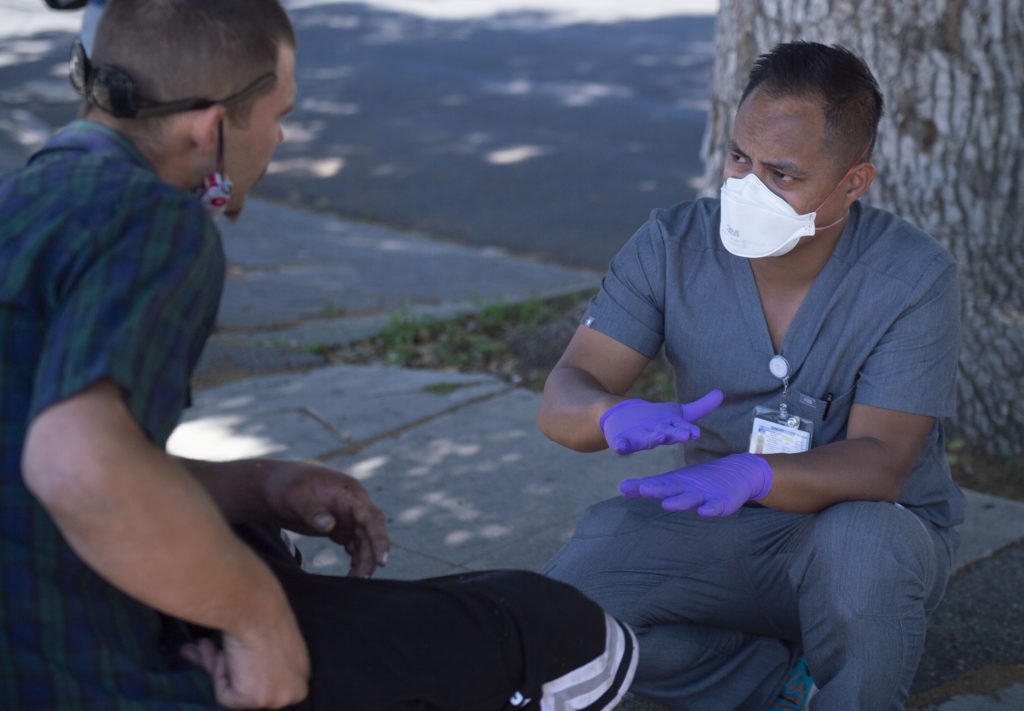
In January 2017, Housing for Health opened the Dr. David L. Murphy Sobering Center, which is operated by Exodus Recovery, Inc. The site provides a welcoming, safe and secure environment for short term (under 24 hours) monitoring and management of persons under the influence of alcohol and/or drugs and provides an alternative to jail and hospital emergency departments. The sobering center operates 24/7, giving those struggling with intoxication the opportunity to sober up and be linked to services that might help address their alcohol and drug issues, and other needs.
- The 50-bed facility allows police and fire departments, outreach and engagement teams and downtown partners to divert people under the influence of alcohol or drugs who may have otherwise been taken to an emergency department or jail.
- The site is a monitored recovery milieu with nursing observation/care, resting beds/pods, showers, light snacks, hydration, and laundry facilities.
- Social services and linkages to community resources are provided including detox, residential rehabilitation, sober living, crisis and interim housing, and primary and mental health care.
- The program is fully integrated with the Health Services Electronic Medical Records system enabling continuity of care.